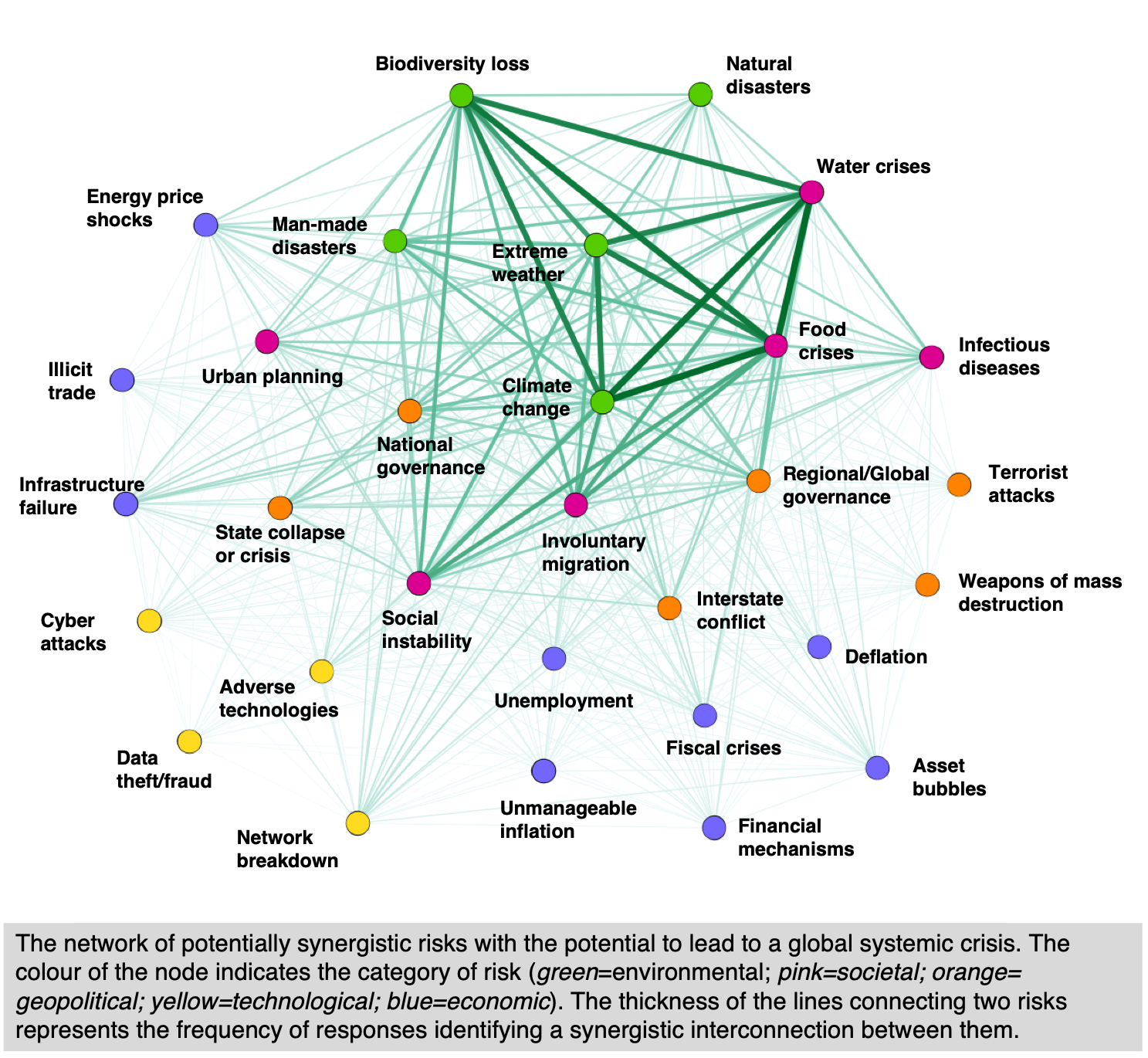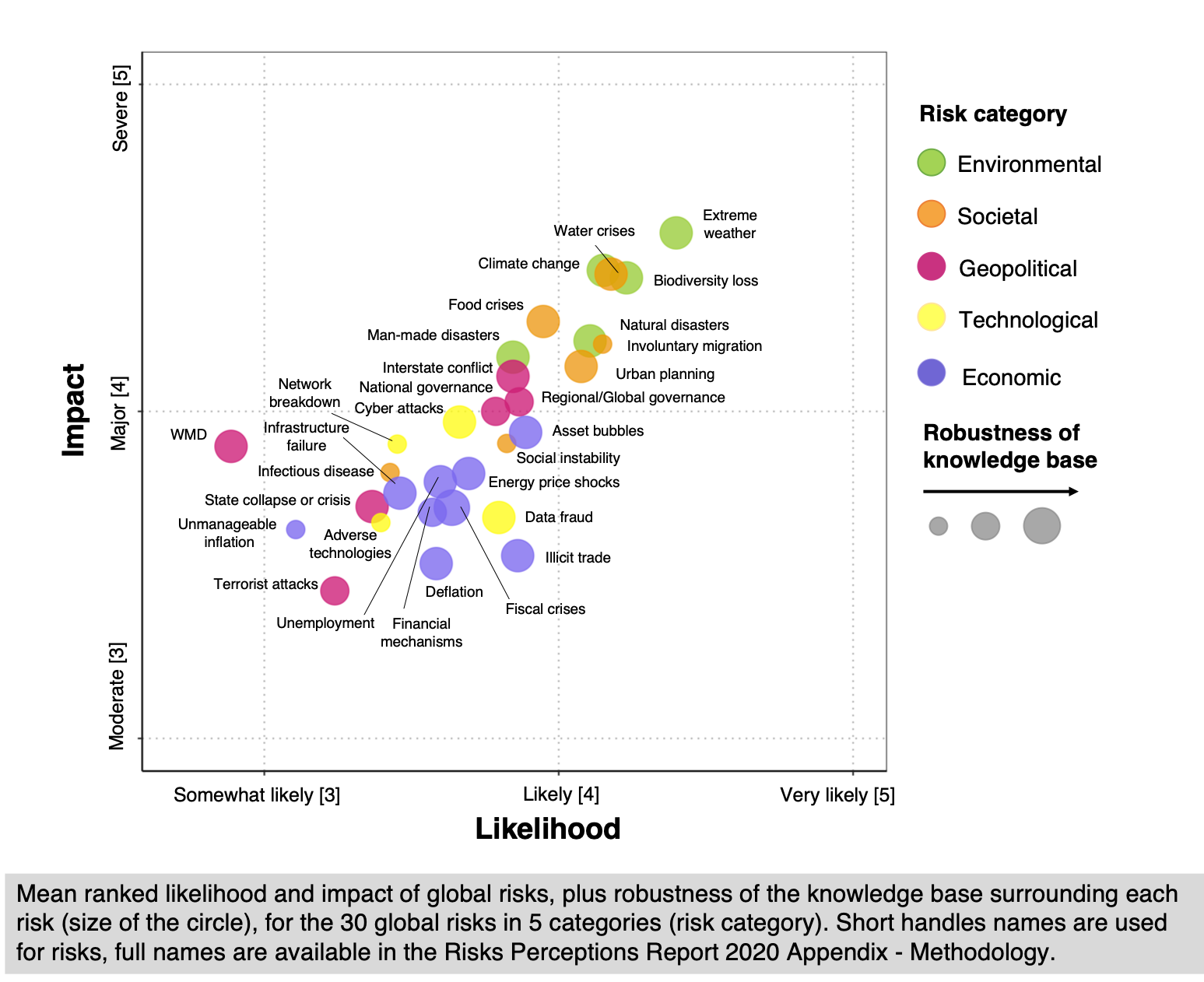FUTURE EARTH RISKS PERCEPTIONS REPORT 2020
1st Edition
Global change scientists’ perceptions on Global Risks
About the Report
The Future Earth Risks Perceptions Report 2020 provides the first overview of the global change science community’s perceptions on global risks. The perceptions of more than 200 scientists from 52 countries were captured in a survey on global risks and are presented here. Scientists included respondents across social, natural and physical sciences who had at least a Master’s degree and more than one year of work experience in their field. The report summarizes these scientists’ perceptions on four major themes: the interconnections between global risks, the urgency of top global risks, future committed risks, and emerging risks. This landmark report makes an important contribution by bringing scientists’ voices into the global dialogue on risks. The survey was not designed to be representative of the full global change science community, but rather capture perceptions from a range and diversity of participants. Full details of the methodological approach and demographic distribution of respondents are available here: Appendix on Methodology.
Key Messages
-
Surveyed scientists identified climate-extreme weather-biodiversity-food-water as a critical nexus of risk that could lead to a global systemic crisis.
-
Climate change is a central driver of potential future global systemic crises according to 72% of respondents.
-
Scientists rank environmental and societal risks as the most urgent, followed by geopolitical, technological and economic risks.
-
Most emerging global risks identified by surveyed scientists were societal risks, e.g. erosion of trust, growing inequality, and a rise in nationalism, etc.
-
A failure to consider feedbacks across systems is also a critical emerging risk.
Interconnected Risks
Global Systemic Crisis
When asked to identify risks with synergistic effects and likely to lead to a global systemic crisis, over 62% of scientists included at least 4 of the following 5 risks: climate change – extreme weather – biodiversity loss – food crises – water crises.
Together these five global risks threaten the continued integrity of our biosphere and its capacity to support human life, i.e. food and water. A number of secondary global risks were also strongly associated with these five, namely involuntary migration, social instability, and failure of national governance or regional / global governance, highlighting the systematic links between climate, ecosystems and society. The question on interconnected risks was assessed by 82 of the 222 scientists who responded to the survey.
A Climate Emergency and Planetary Crisis
72% of responding scientists identified climate change as a central driver to a potential future global systemic crisis.
Of the scientists responding to the question on which global risks are most likely to have synergistic effects and lead to a global systemic crisis, 72% of responses included climate change. Given the serious concerns that scientists have raised about our capacity to keep global climate warming below 2ºC under current development trajectories, it stresses the urgency and scale of rapid societal transformation needed to avoid a climate crisis. It is crucial that we recognize that the climate crisis is not isolated, but connected to many other systems, in particular, biodiversity loss, food crises and water crises.
Top Risks
Scientists rank Environmental & Societal risks as most urgent global risks.
Based on responses from 221 global change scientists, Environmental or Societal risks ranked as the top 8 most urgent risks and were perceived to be likely with the potential for major to severe impacts across multiple countries were either. Of these, extreme weather stood out as the top global risk.
Along with extreme weather, biodiversity loss, water crises and climate change were the next most urgent risks in terms of their perceived likelihood and impact. These were followed closely by food crises, failure of urban planning and involuntary migration as well as natural disasters and man-made disasters.
Committed Risks

Scientists were asked to identify risks which they believe we have already committed to or will commit to in the next 10-years that will put us on a path towards irreversible or catastrophic outcomes. Scientists overwhelmingly pointed towards climate change, biodiversity loss and ecosystem collapse.
These results echo conclusions in the IPCC Special Report on Global Warming of 1.5°C (IPCC 2018) and the Special Report on the Ocean and Cryosphere in a Changing Climate (IPCC 2019) which highlight a number of long-term impacts already committed to in the climate system. For example, when a forest is dying, it does not release CO2 to the atmosphere immediately, but gradually over the following years and decades through microbial decomposition (i.e. committed emissions). Similarly, when a fragment forests do not immediately lose species in those patches but they go gradually go extinct locally as the forest patch is insufficient in size to support their populations (Tilman et al 1994). Recent assessment by the IPBES warns that up to a million species may be threatened with extinction within decades due to a combination of land use change, direct exploitation, climate change, pollution and invasive species (IPBES 2019).
Emerging Risks
When asked to identify additional or emerging risks not already considered in the survey, but of rising importance in the context of global sustainability and stability, seven risks were commonly cited by scientists (listed below). Of note is the large number of emerging global risks focused on societal issues, e.g. erosion of societal trust and cohesion, rising inequality, and rising nationalism; as well as lesser discussed issues such as deterioration of mental health. Together these suggest a need for greater consideration of multiple dimensions of societal well-being in our efforts for a societal transition towards a safe and equitable future.

Erosion of societal trust, cohesion, and values
Growing distrust within and between groups (including government, business, public institutions and the public), leading to an increase in social tensions and individualism.

Rising inequality
A major divide in the quality and quantity of resources available to different segments of the population, including, but not limited to natural resources, income, and healthcare.

Failing to take into account feedbacks across systems
In development, planning, and business decisions, failing to take into account the interconnections between problems, solutions, risks, and opportunities could have significant detrimental consequences.

Rise of nationalism
The emergence of political structures that promote nationalist ideas of identity and isolation from other countries and undermine intergovernmental processes.

Deterioration of social infrastructure
The weakening of services and facilities that help communities meet their social needs.

Overpopulation
The potential for the world population to reach a threshold that exceeds the planet’s carrying capacity, potentially leading to ecological and societal collapse.

Deterioration of mental health
A significant and widespread decline in mental health affecting emotional, psychological, and social well-being with impacts on economic, political, and social spheres.

